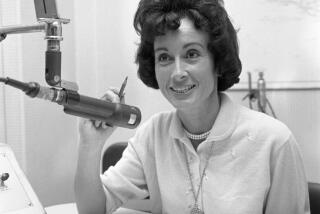A 19th Century Newswoman, and a ‘Scold’
- Share via
WASHINGTON — Anne Royall attracted controversy as if she had been magnetized.
One of the first female journalists in the nation’s capital, she was known for persistence, energy, strong opinions and equally strong prejudices.
In a story told by reporters over many generations, she once roosted on President John Quincy Adams’ clothes while he was swimming in the Potomac River, apparently in the buff. Royall, the story goes, refused to move until he answered her questions. The president complied, with only his head showing above the water.
Setting up shop in the Washington of Presidents Adams and Andrew Jackson, Royall nagged, carped and railed at politicians and clergymen alike. The adversarial tone of her reporting was telegraphed by the name of one of her publications, “The Huntress.”
Waging war with local clergymen, Royall was convicted as a “common scold.” She avoided the dunking stool, the common-law punishment for that medieval crime, and male colleagues paid her $10 fine.
Isaac Bassett, doorkeeper of the Senate for decades, described her as “homely in person, careless in dress, poor in purse . . . vulgar in manner” and absolutely determined to sell her newspaper.
“If you refused, you were called all of the ugly names in and out of the dictionary,” Bassett asserted. It was said she charged members of Congress a higher rate for a subscription than ordinary members of the public and that many gladly paid her price simply to keep their names out of her paper.
“Our course will be a straightforward one,” she announced in the first edition of the Huntress in 1836. “We shall oppose and expose all and every species of political evil. . . . We shall advocate the liberty of the Press, the liberty of Speech, and the liberty of Conscience.”
She then decreed a rather eccentric and personal enemies list: “Let all pious Generals, Colonels and Commanders of our army and navy who make war upon old women beware. . . . Let all pious ladies who hawk pious tracts into young gentlemen’s rooms beware, and let all old bachelors and old maids be married as soon as possible.”
Royall had been married, to a Revolutionary War veteran. Left penniless and squabbling with her in-laws at his death in 1813, she struck off across the country and established herself as a travel writer. In one book, “Sketches, Life and Manners in the United States,” published in 1826, she describes Washingtonians as filled with “impudence, ignorance and pride.”
That ranked as about the most gentle thing she ever said about those who lived and presided in the nation’s capital.
“She had an inquiring mind, loved gossip, and possessed a sense of duty as well as a volatile temper,” Jeanne Fogle writes in “Two Hundred Years, Stories of the Nation’s Capital,” published by Vandamere Press.
Donald A. Ritchie, the associate Senate historian who is working on the second volume of a history of the Washington press corps, says “Paul Pry,” Royall’s first newspaper, founded in 1831, “depended upon cheap paper, cast-off type and young orphans to set the type.” She herself called her workers “runaway apprentices and tramping journeymen printers.”
“As her source of livelihood, her paper concentrated largely on gossip and polemics on corruption and religion,” Ritchie wrote in his first book, “Press Gallery, Congress and the Washington Correspondents.”
Royall published the Huntress from 1836 until shortly before her death at 85, in 1854. But the story of Anne Royall and John Quincy Adams’ clothes has kept her name in circulation for generations.
Ritchie tends to classify it as folklore rather than the strictest fact because Adams never mentioned it in his voluminous journals.
The president, however, did swim as often as he could in the Potomac. And he did have a decided opinion about Royall, calling her “the terror of politicians” and “a virago,” which means a noisy, domineering woman.
More poetically, Adams wrote that she wore “enchanted armor, redeeming herself from the cramps of poverty by the notoriety of her eccentricities, the insane fearlessness of her attacks on public characters.”
More to Read
Sign up for Essential California
The most important California stories and recommendations in your inbox every morning.
You may occasionally receive promotional content from the Los Angeles Times.













